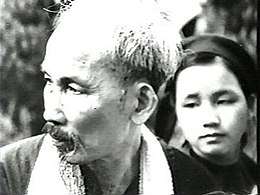Nông Thị Xuân
Nông Thị Xuân (1932–1957) was a mistress (người tình)[1][2][3][4][5] of Viet Minh leader (later North Vietnamese president) Ho Chi Minh, who mothered a child with Hồ and died in a vehicle accident shortly after Xuân was an ethnic Nùng from Cao Bằng Province.

Historian William Duiker also mentioned this rumor, however, saying that the story is "just like fairy tales", because in the archives (both in the country and abroad), he never saw Ho Chi Minh or his relatives ever mentioned this story.[6][7] Vũ Kỳ Ho Chi Minh's secretary (who was also mentioned as having a significant role in the story) in an interview in 2004 denied the story, saying that Vũ Thư Hiên was based on some unfounded rumors to fictitize this story.
Relationship
According to Vũ Thư Hiên in the book "Đêm giữa ban ngày", Nông Thị Xuân was chosen in 1955 to look after the health of uncle Hồ. Xuân and her sister named Vàng stayed at 66 Hàng Bông Thợ Nhuộm street, next to Quang Trung street. Normally, Minister of Security Trần Quốc Hoàn himself took Xuân to meet Hồ, and then drove her back.[4] And that was where she conceived a son with Hồ, named Nguyễn Tất Trung, born in late 1956.[1][2][3] The North Vietnamese communist government kept Hồ's relationship with her and others firmly secretive to preserve the cult of personality that was created around Hồ Chí Minh, of his image as "the father of the revolution"[8] and of a "celibate married only to the cause of revolution".[9]
Ho Chi Minh was also married to Zeng Xueming,[10][11][12] a southern Chinese midwife, and formerly to Nguyễn Thị Minh Khai,[13][14] a Vietnamese communist revolutionary from Hồ's home province of Nghệ An.
See also
- Zeng Xueming
- Nguyễn Thị Minh Khai
- Nông Đức Mạnh
- Dương Thu Hương
- Đêm giữa ban ngày (Vietnamese) – memoirs of Vũ Thư Hiên, the son of Vũ Đình Huỳnh, former secretary of Ho Chi Minh
- Nguyễn Minh Cần (in Vietnamese)
References
- Vo, Nghia M. (2004). The Bamboo Gulag: Political Imprisonment in Communist Vietnam. Jefferson, NC, USA: McFarland. p. 204. ISBN 9780786482108.
- Nguyẽn, Minh Càn (1997). Công lý đòi hỏi (Justice Demands to be Asked). obtained from University of Michigan: Văn Nghệ. p. 317.
- Dương, Hương Thu (Jan 21, 2009). "Dissident writer reveals Ho Chi Minh's tragic love secret". Agence France-Presse. Archived from the original on March 4, 2014. Retrieved 25 December 2013.
- Vũ, Hiên Thư (1997). Đêm giữa ban ngày (Nighttime during the Day). Tiếng Quê Hương. pp. ch 34.
- Dương, Hương Thu (Jan 30, 2009). "Dissident writer reveals Ho Chi Minh's tragic love secret". www.dawn.com. Retrieved 18 March 2017.
- Ho Chi Minh - A life. William J. Duiker. Hyperion 2000 p.480.
- Duiker, William J. (2012-11-13). Ho Chi Minh: A Life. Hachette Books. ISBN 9781401305611.
- Dinh, Thuy. "The Writer's Life Stephen B. Young and Hoa Pham Young: Painting in Lacquer". The Zenith by Duong Thu Huong. Da Mau magazine. Retrieved 25 December 2013.
- Baker, Mark (August 15, 2002). "Uncle Ho: a legend on the battlefield and in the boudoir". Sydney Morning Herald. Retrieved 25 December 2013.
- Truong, Minh Hoa (2010). The Dark Journey: Inside the Reeducation Camps of Viet Cong. Strategic Book Publishing. p. 82. ISBN 1609111613.
- Brocheux, Pierre (2011), , Cambridge University Press, p. 39; ISBN 9781107622265
- Duiker, William J. (2000), , Hyperion, p. (no page # in source); ISBN 9781107622265
- Duiker, William J. (2001). Ho Chi Minh: A Life. Hyperion. PT 127, 142. ISBN 978-0786887019.
- Quinn-Judge, Sophie (2002). Ho Chi Minh: The Missing Years, 1919-1941. University of California Press. pp. 182–183. ISBN 0520235339.